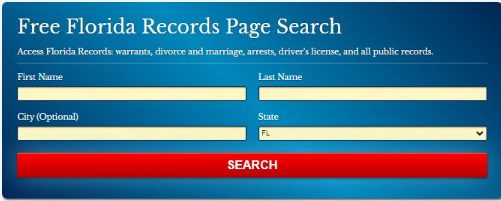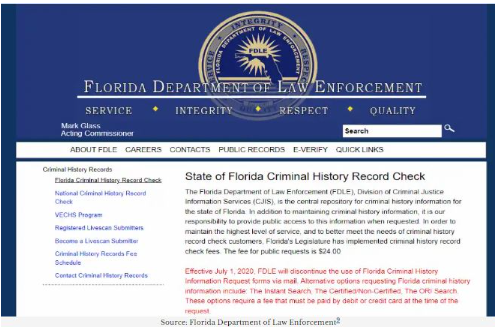
When searching for Florida arrest records, one valuable online resource is Arrests.org FL. This website provides a user-friendly platform to access and explore arrest records across the state of Florida. By utilizing Arrests.org FL, individuals can gain insights into the legal history of a person, helping them make informed decisions or satisfy their curiosity about someone’s background. The platform aggregates information from various law enforcement agencies, making it a comprehensive and reliable source for accessing arrest records in Florida. Users can navigate the site efficiently, entering relevant details to retrieve specific records or simply browsing through the database to stay informed about the legal history of individuals in the region.
When using Arrests.org FL, it’s essential to understand the significance of the information obtained. Arrest records can reveal details about a person’s encounters with the law, including charges, mugshots, and other pertinent data. However, it’s crucial to approach this information with sensitivity and discretion, as arrests do not always indicate guilt, and individuals may have gone through legal processes resulting in acquittal or dismissal of charges. Arrests.org FL serves as a valuable tool for those seeking transparency and awareness regarding arrest records, but users should interpret the information judiciously and consider the context surrounding each case.

Click Here to Search this form: https://florida.recordspage.org/
At the core of our services lies the FDLE, the primary custodian of arrest records in Florida. We understand the significance of accessing accurate and up-to-date information, and our platform serves as a reliable conduit to achieve just that. From residents to those arrested within the state, our extensive database caters to diverse needs. Navigate Florida’s legal landscape with confidence, leveraging our user-friendly interface and streamlined processes to obtain the crucial information you seek.
Embark on your journey into Florida’s legal archives by submitting a Public Records Request. Our user-friendly Request for Access to Public Records form, available on the FDLE website, is the key to unlocking the information you need. As you fill out the form, rest assured that our dedicated team will review your request diligently, ensuring a swift and efficient process. Your approval opens the door to a wealth of information that can provide clarity and insight.
While the path to accessing arrest records involves a processing fee, we believe in transparency to empower our users. Our fee structure is straightforward, based on the volume of records and the requested format. This ensures that you have a clear understanding of the costs associated with obtaining the information you seek. We prioritize your experience, making sure that financial considerations don’t hinder your access to vital records.
For those seeking an extra layer of convenience, consider exploring third-party services dedicated to public records access. These services specialize in searching, retrieving, and compiling arrest records, providing a hassle-free solution for individuals with specific requirements. It’s important to note that while these services offer added convenience, they do involve a fee. Explore this option to tailor your experience to your unique needs and preferences.
Understanding the nuances of access restrictions is paramount in your quest for information. Not all arrest records are publicly accessible, and the FDLE takes measures to protect sensitive information. Certain details may be redacted, and records might be withheld if they are deemed confidential or under active investigation. Our commitment to privacy and legal compliance ensures a responsible approach to information access, preserving the integrity of the legal process.
Individuals with Florida arrest records have the opportunity to shape their narrative through sealing or expungement. These processes offer avenues for mitigating the impact of past encounters with the law, providing options that cater to different needs.
Sealing: A Layer of Privacy
Opting for sealing makes the record less accessible to the public. While the information remains on file, it adds a layer of privacy, allowing individuals to move forward with greater discretion.
Expungement: A Fresh Start
For those seeking a more comprehensive solution, expungement is the path to a fresh start. This process results in the complete destruction of the record, offering individuals the opportunity to truly leave their past behind.
Initiating the Process
To embark on the journey of sealing or expunging, individuals must meet specific eligibility criteria, follow procedures outlined by the Florida legislature, obtain a court order, and submit the required documentation. This multi-step process is designed to ensure that those seeking these options are well-informed and equipped to navigate the legal requirements.
To provide you with a comprehensive understanding of the legal processes involved, we offer links to additional resources. These sources, including the Florida Department of Law Enforcement, Florida Courts Online – Seal and Expunge Process, and the Florida Bar Association – Sealed and Expunged Records, serve as valuable guides. Delve into these resources for in-depth knowledge and guidance, empowering yourself with the information needed to navigate the complexities of sealing or expunging arrest records.
Whether you are a legal professional, a concerned citizen, or an individual seeking personal clarity, the Florida Arrest Records Hub is your starting point for unlocking the information you need. Our platform is designed to make the process accessible, transparent, and informative, ensuring that you navigate Florida’s legal landscape with confidence. Trust us as your guide through the intricate web of arrest records, and embark on a journey towards understanding and empowerment. Welcome to the Florida Arrest Records Hub – where information meets integrity, and your journey towards clarity begins.
Embarking on the journey to uncover someone’s criminal charges or records in Florida requires a systematic approach through the official channels of the state’s law enforcement agencies. To initiate this process, individuals can delve into the comprehensive database maintained by the Florida Department of Law Enforcement (FDLE), the central repository for criminal history records within the state. Navigating this realm involves submitting a Public Records Inquiry, facilitated by completing the requisite forms available on the FDLE’s official website. The meticulous review process by the FDLE ensures that the request aligns with legal and ethical standards. Upon approval, the FDLE provides access to the requested criminal records, offering valuable insights into an individual’s legal history, arrests, and charges.
Understanding the nuances of accessing criminal records in Florida is crucial, given the state’s commitment to balancing public access with privacy considerations. The transparency of the process, coupled with the FDLE’s commitment to upholding legal standards, fosters a responsible and accountable approach to obtaining such sensitive information. As individuals embark on the path of discovering criminal charges or records in Florida, they contribute to a society where access to information is governed by established protocols, ensuring the judicious use of data for lawful purposes.

Unlocking Florida’s legal archives provides a wealth of information that can be crucial for various individuals, including legal professionals, researchers, and concerned citizens. These archives, maintained by the Florida Department of Law Enforcement (FDLE), house comprehensive arrest records, offering insights into criminal histories. Accessing this information can be valuable for legal research, background checks, and understanding the legal landscape in the state.
Florida’s legal archives encompass a vast array of data, from residents’ records to those who have been arrested within the state. Whether you are involved in legal proceedings, interested in community safety, or simply seeking personal clarity, exploring these archives can be instrumental in gaining a deeper understanding of the legal fabric that shapes Florida.
Initiating a request for access to public records in Florida involves a straightforward process:
Obtain the Request Form: Start by obtaining the Request for Access to Public Records form, available on the FDLE website. This form serves as the official document signaling your intent to access specific arrest records.
Complete the Form: Fill out the form with the required details, ensuring accuracy and completeness. Include pertinent information, such as the names and details of individuals whose arrest records you are seeking.
Submit the Request: Submit the completed form to the FDLE for review. The FDLE’s dedicated team will carefully assess your request, and upon approval, you will gain access to the requested arrest records.
Accessing arrest records in Florida involves a processing fee determined by the FDLE. The fee is based on the volume of records requested and the desired format of delivery. This transparent fee structure ensures clarity for users, allowing them to plan accordingly. While there is a cost associated with obtaining these records, the transparency in fees emphasizes our commitment to providing straightforward and accessible information to those who seek it.
Yes, exploring third-party services is an option for those seeking added convenience in accessing arrest records. These services specialize in the retrieval and compilation of public records, streamlining the search process. Users can leverage these services for efficiency, though it’s important to note that they typically involve a fee.
Third-party services work by offering a user-friendly platform where individuals can input relevant information, and the service then conducts the necessary searches within its database. While convenient, users should be aware of the associated costs and carefully review the terms and conditions of such services.
Not all arrest records are publicly accessible, and certain information may be restricted to protect individuals’ privacy and adhere to legal guidelines. The FDLE may redact specific details, such as sensitive personally identifiable information (PII) or information that could compromise an ongoing investigation. Records may also be withheld if they are deemed confidential. Our commitment to privacy and legal compliance ensures a responsible approach to information access, balancing the public’s right to know with the need to protect sensitive information.